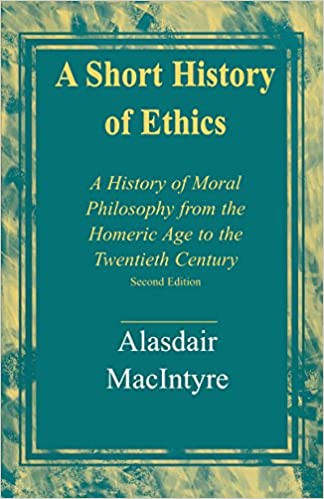A Book Summary from Books At a Glance
About the Author
Alasdair MacIntyre is one of the most influential moral philosophers in the last 100 years. His books have been widely hailed as providing seminal thought and analysis of moral concepts and political philosophy.
Introduction
This book is an accessible survey and analysis of key thinkers and developments in the history of ethics. MacIntyre is an expert in this field and has the ability to succinctly and coherently get to the main points of the ethical systems he examines. The resulting narrative and analysis is very helpful for gaining a grasp of how moral philosophy developed in the history of Western thought, and for helping us understand the current milieu.
Table of Contents
Chapter 1 The Philosophical Point of the History of Ethics
Chapter 2 The Prephilosophical History of “Good” and the Transition to Philosophy
Chapter 3 The Sophists and Socrates
Chapter 4 Plato: The Gorgias
Chapter 5 Plato: The Republic
Chapter 6 Postscript to Plato
Chapter 7 Aristotle’s Ethics
Chapter 8 Postscript to Greek Ethics
Chapter 9 Christianity
Chapter 10 Luther, Machiavelli, Hobbes, and Spinoza
Chapter 11 New Values
Chapter 12 The British Eighteenth-Century Argument
Chapter 13 The French Eighteenth-Century Argument
Chapter 14 Kant
Chapter 15 Hegel and Marx
Chapter 16 Kierkegaard and Nietzsche
Chapter 17 Reformers, Utilitarians, Idealists
Chapter 18 Modern Moral Philosophy
Book Summary
Chapters 1 & 2
Moral values and philosophy cannot be detached from a study of history. Moral concepts are part of the fabric of societies, and both moral concepts and societies change throughout history. Social lives can be distinguished in part on the basis of differences in ethics. For example, the concept of justice differs in ancient Greece and the contemporary Western world. There are both continuities and discontinuities. We must allow historical periods and thinkers to speak for themselves—a danger is that we will impose our particular view of moral discourse onto older thinking and limit the topics that we take to be “moral.” As much as possible, we must listen to what those in history took to ethics to be, even if we consider some of their views to deal with non-moral issues rather than moral ones.
In ancient Greece, it was recognized that thinking about moral concepts required philosophical analysis. Terms that had been assumed to be clear no longer were seen as such, and societal practices had also changed. For Homer, a king is good (agathos) if he is courageous and has led in successful battles. Agathos is tied to his behavior. Today, we could say that a king is good but not a leader in battle; for Homer, that would have been a direct contradiction. In the world of Homer, these judgments are not based on whether the individual could have done otherwise (there is no Kantian “ought” implies “can”). To feel “shame” is to know you have failed to measure up to the societal expectations others have of you.
[To continue reading this summary, please see below....]The remainder of this article is premium content. Become a member to continue reading.
Already have an account? Sign In
